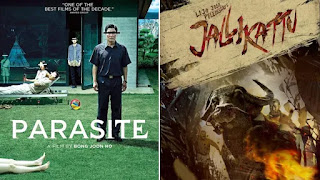This generation - us - has been witness to some astounding stuff. We've gone from chunky VCR tapes to CDs to Blu Ray and now OTT, where a click of a button transports you into a bottomless cinematic universe. And that's just in case of the movies. And along with that, we also witnessed the first-ever non-English language film going on to win the Oscar for Best Picture. When Bong Joon Ho's Parasite made history.
Now, true blue Joon Ho fans will tell you that Parasite is no Memories Of A Murder. And while that debate may rage on, it doesn't take away from the fact that Parasite opened up a door into a new world for non-English cinema. And by extension, for Jallikattu, the Malayalam masterpiece and India's official entry into the 93rd Academy Awards in the Best International Feature Film category.
Watch the trailer of Parasite here:
FREEING THE OSCARS
The Oscars aren't like the Emmys where there's a separate event altogether for non-American content. The Oscars invites entries in all languages and essentially rewards excellence in cinema. Yet until 2020, this cinema needed to be in English, with non-English content being restricted to Foreign Language Film or International Feature Film categories. Parasite was also nominated for the same, and it won the same too. And then it went on to win Best Picture as well, thus finally breaking the language barrier. Now, art is language in itself, as it should.
Here's the trailer of Jallikattu:
STORIES THAT TRANSCEND BORDERS
Parasite wasn't dubbed. It had subtitles, and that was enough to convey a story about class divide in South Korea to a world audience. The simple reason it managed to do that is because while being intrinsic to the South Korean societal structure, a story of haves and have-nots transcends borders. It is true for India just as much as it is true for Argentina. When the Kims and the Parks, two families on two opposite ends of the socio-economic spectrum, clashed, we got it and we didn't need elaborate language to convey it to us. The powerful screenplay - which Parasite won another Oscar for, by the way - was enough.
And Parasite could very easily have been a story about India - a Dharavi jhopdi versus the bungalows of Altamount Road. Jallikattu, on the other hand, is an allegorical story about a bull raging and rampaging through a village in Kerala as the villagers try to capture it. But it's beyond just that. In Jallikattu, it is the man who is the beast, and the bull is more human than humans today are capable of being. The name does ring a bell - the traditional event, a sport of sorts intrinsic to Tamil Nadu, but that's only a metaphor. If animal cruelty is at the centre of Jallikattu, can a viewer in Spain or Mexico not be able to understand it? With or without dubbing?
A NEW HOPE
Yes, there's a long way to go for Jallikattu. First, it needs to make the shortlist and bag a nomination at the 93rd Academy Awards. But Parasite's win last year gives one hope. That once you cross that shortlist checkpoint, the world could be yours. Even if this year Jallikattu doesn't make it, Parasite has managed to inspire filmmakers from across the globe, telling stories about their countries, in their own way, that the erstwhile elusive Oscar trophy isn't so elusive anymore. We're, after all, global citizens, one film at a time. Shrunken onto a mobile screen now.







0 Comments